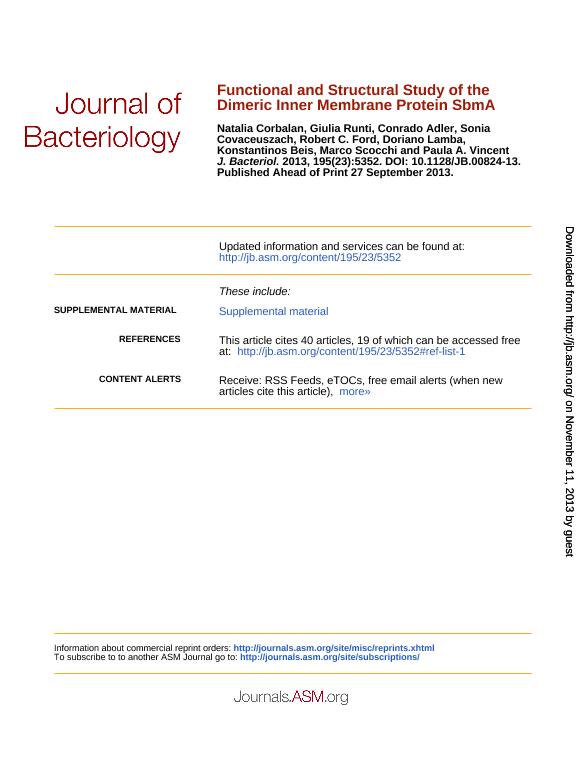Artículo
Functional and Structural Study of the Dimeric Inner Membrane Protein SbmA
Corbalan, Natalia Soledad ; Runti, Giulia; Adler, Conrado
; Runti, Giulia; Adler, Conrado ; Covaceuszach, Sonia; Ford, Robert C.; Lamba, Doriano; Beis, Konstantinos; Scocchi, Marco; Vincent, Paula Andrea
; Covaceuszach, Sonia; Ford, Robert C.; Lamba, Doriano; Beis, Konstantinos; Scocchi, Marco; Vincent, Paula Andrea
 ; Runti, Giulia; Adler, Conrado
; Runti, Giulia; Adler, Conrado ; Covaceuszach, Sonia; Ford, Robert C.; Lamba, Doriano; Beis, Konstantinos; Scocchi, Marco; Vincent, Paula Andrea
; Covaceuszach, Sonia; Ford, Robert C.; Lamba, Doriano; Beis, Konstantinos; Scocchi, Marco; Vincent, Paula Andrea
Fecha de publicación:
09/2013
Editorial:
American Society for Microbiology
Revista:
Journal Of Bacteriology
ISSN:
0021-9193
e-ISSN:
1098-5530
Idioma:
Inglés
Tipo de recurso:
Artículo publicado
Clasificación temática:
Resumen
SbmA protein has been proposed as a dimeric secondary transporter. The protein is involved in the transport of microcins B17 and J25, bleomycin, proline-rich antimicrobial peptides, antisense peptide phosphorodiamidate morpholino oligomers, and peptide nucleic acids into the Escherichia coli cytoplasm. The sbmA homologue is found in a variety of bacteria, though the physiological role of the protein is hitherto unknown. In this work, we carried out a functional and structural analysis to determine which amino acids are critical for the transport properties of SbmA. We created a set of 15 site-directed sbmA mutants in which single conserved amino acids were replaced by glycine residues. Our work demonstrated that strains carrying the site-directed mutants V102G, F219G, and E276G had a null phenotype for SbmA transport functions. In contrast, strains carrying the single point mutants W19G, W53G, F60G, S69G, N155G, R190, L233G, A344G, T255G, N308G, and R385G showed transport capacities indistinguishable from those of strains harboring a wild-type sbmA. The strain carrying the Y116G mutant exhibited mixed phenotypic characteristics. We also demonstrated that those sbmA mutants with severely impaired transport capacity showed a dominant negative phenotype. Electron microscopy data and in silico three-dimensional (3D) homology modeling support the idea that SbmA forms a homodimeric complex, closely resembling the membrane-spanning region of the ATP-binding cassette transporter family. Direct mapping of the sbmA single point mutants on the protein surface allowed us to explain the observed phenotypic differences in transport ability.
Palabras clave:
Sbma
,
Function
,
Structure
,
Dimer
Archivos asociados
Licencia
Identificadores
Colecciones
Articulos(INSIBIO)
Articulos de INST.SUP.DE INVEST.BIOLOGICAS
Articulos de INST.SUP.DE INVEST.BIOLOGICAS
Citación
Corbalan, Natalia Soledad; Runti, Giulia; Adler, Conrado; Covaceuszach, Sonia; Ford, Robert C.; et al.; Functional and Structural Study of the Dimeric Inner Membrane Protein SbmA; American Society for Microbiology; Journal Of Bacteriology; 195; 23; 9-2013; 5352-5361
Compartir
Altmétricas



